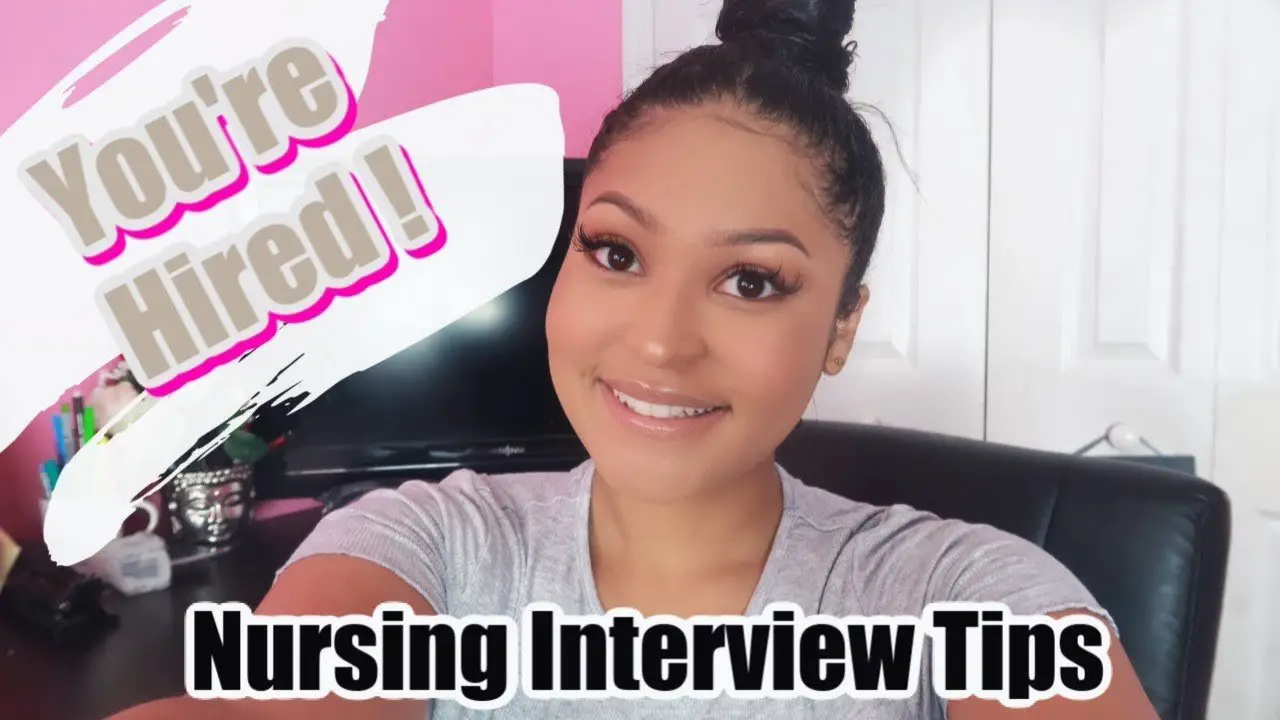What Would You Do If You Saw Someone Administering Improper Medication Or Not Washing Their Hands
If an interviewer asks you this question, what they really want to know is if you are willing to do something or say something. Nursing is mostly about patient safety, and you must be willing to confront your employees or colleagues about improper patient care. This displays your ability to give feedback and shows you know how to work in a team. Answer this question calmly and explain what steps you would take to make sure this person administered proper care.
Example:”If I saw someone administering improper medication, I would confront them and educate them on the reasons why it is important to pay close attention to the metrics on a patient’s chart. I’d also discipline them according to the healthcare institution’s rules. If I saw someone skip washing their hands, I’d pull them aside and have a discussion with them about the seriousness of protecting patients from germs and bacteria. I would monitor the nurses who committed these errors closely for the next month to make sure they complied with all rules and regulations.”
Prepare For Behavioral Questions
Many employers favor behavioral questions, which require applicants to describe how they have or would behave in specific situations. Because even one mistake can be fatal in nursing, health care recruiters rely on these questions to assess the competence of RN applicants. The Mayo Clinic recommends using the SHARE model for responding to these questions. You start by describing a specific situation, followed by noting hindrances or challenges to addressing the situation. Next, you describe your actions and discuss the results. Finally, you evaluate what you learned from the experience.
Describe A Situation Where You Had To Work With A Difficult Coworker How Did You Handle It
With this question, make sure you dont throw anybody under the bus. You want to include a resolution and what you learned anything from the situation.
Example answer:
I worked the night shift with a nurse who consistently showed up late for their shift. This would impact the whole team and put us behind. I took time to talk with the nurse and asked them if switching shifts would help them arrive to work on time. My co-worker said it would help them since the particular hour they were scheduled was difficult for them. We switched, and that solved the problem. I learned that taking initiative goes a long way.
Spot on! This shows an ability to adapt and problem-solve. Hiring managers want to find someone who can overcome a tough situation and find a resolution. Moreover, it shows character since you were willing to sacrifice for the team. Kudos.
Recommended Reading: System Design Interview Prep
What Do You Understand By The Term Diversity At Work
The employer is looking to identify your people skills here, and how you are able to adapt and handle stress under different environments.
In answering this question you might want to talk about experiences on the wards where you have witnessed or demonstrated a commitment to diversity on the wards. Or, if relevant, you could talk about how your own background, upbringing and culture has shaped your interactions with those who are different to you.
Sample Nurse Interview Questions With Answers

Here are some sample nursing manager interview questions with answers, as well as advice on how to answer each question. Keep in mind that the interviewer is interested in the clarity of your answers and your overall approachability.
-
How do you handle emergency situations? Give an example.
-
What is the greatest success you’ve had with nursing?
-
Are nursing skills or management skills more important? Explain.
-
How do you deal with a patient who is upset?
-
What would you do if you saw someone administering improper medication or not washing their hands?
Also Check: Best System Design Interview Prep
How To Prepare For A Phone Interview
- Be ready 10 minutes early, so you dont sound rushed.
- Eliminate background noise and distractions, for example, from children and pets.
- Make sure your phone or laptop is fully charged, and use headphones/earphones for optimal sound.
- If youll be using your landline, turn your mobile phone off.
- Have some water handy. If your mouth is dry, youll sound nervous.
- Use paper and pen for note taking to avoid the noisy clicking of computer keys.
- Do some voice exercises before the call, especially if you havent spoken in several hours.
- Posture has an impact on your voice, so stand or make sure you sit up very straight during the call.
- Smile as you speak it really makes a difference! A good time to smile is when you talk about the work youve done, ask questions, or express your enthusiasm about the company.
Nursing Interview Questions & Answers To Land Your Dream Job
So your big day has arrived and its time to hit the proverbial nail right on the head. As a prospective nurse, youre undoubtedly running through a checklist of what-to-dos as you prepare for your first job interview.
If you want to stand out from the other applicants and get the job, youll need to put in a little extra preparation. You dont have to be a genius or have perfect interview skills just find what distinguishes you from the rest of the pack and market it.
Recommended Reading: Preparing For System Design Interview
How Would You Handle A Disagreement With A Doctor
When you answer this question, emphasize your interpersonal skills such as active listening, teamwork, flexibility to solve problems and the ability to follow the chain of command when necessary. In your response, mention that you will first work directly with the doctor to resolve the discrepancy. If further assistance is needed, you may need to speak to your supervisor for assistance.
Example:I had a situation while working in the ER at a small hospital. We were understaffed on certain nights and everyone would be busy. One night, I looked over a patient’s chart and the prescription did not look right. First, I called the doctor to resolve the discrepancy. The doctor confirmed the original prescription, but it still did not look right to me. At that point, I decided to discuss it with my supervisor. When the three of us reviewed the prescription together, the doctor did eventually realize there was an error. We were able to correct the prescription and provide the patient with the right treatment.
Nine Stand Out With A Portfolio
A sure way to stand out from other candidates is to prepare your professional nursing portfolio.
A nurse portfolio provides tangible evidence to the statements made both on your resume and during your interview. It is both a valuable tool to be utilized at career fairs and networking events as well as at interviews.
We suggest creating your portfolio early in your career and adding to it as your career progresses. When providing it at an interview, be sure to bring at least five copies.
The supplies youll need to develop your portfolio include:
- 3 ring binder or presentation folder
- Clear divider sheets
Read Also: Cfo Interview
Why Havent You Enrolled For Registered Nurse
Nurses earn twice as much as CNAs, and they can find the same meaningful purpose in their jobs. Technically, if the situation allows , only a few people would opt for CNA instead of a nurse.
On the other hand, it is much easier to start the career as nursing assistant, much cheaper as well, and one can always pursue nursing career later on, if they feel like doing it at some point in their life. So, why do the interviewers ask the question? They are testing your trustworthiness and honesty, a hard found quality on the job market.
Speak openly about your situation, decisions, and reasons why it was impossible for you to enroll for a nursing school. Alternatively you can say that you plan to test the waters for a couple of years, and plan to enroll for RN later, if you still enjoy the job.
I know that nursing job is better than the one of a CNA, in all means. But my financial situation did not allow me to study at the college and to invest money into nursing education. I have a family and I have to provide. I needed a job I could get in a short time, and I went for CNA. One day I may enroll for registered nurse, but only future will tell if it happens, because it depends on many things.
To speak honestly, I am not bright enough to graduate from the college. I am aware of my limitations and I think it is better to do a job one is good at and love, than to spend life trying to graduate from the college, what might as well never happen, at least not in my case.
Expert Advice For Nurses
Monique Doughty BSN-RN, is a Critical Care travel nurse and entrepreneur providing advice, inspiration, and support for future and current nurses through her blog The Resilient Nurse. Follow her on and .
Before your interview, research the companys mission and purpose and feel comfortable enough to discuss their core values. Dress professionally for business, perform a mock interview with a friend, and make eye contact. Finally, believe in your talents and know you are fully deserving of this position.
Read Also: Mailscoop Io
Why Do You Want To Be A Nurse
This question gets to the heart of why you decided to pursue a nursing career. More specifically, a recruiter is probably trying to suss out whether or not youre a nurse for the right reasons. Answer this question honestly and on a personal level. Emphasize your adaptability and dedication to a communal goal to help others.
Ask Your Own Questions

Don’t underestimate the importance of being prepared should the interview committee ask if you have any questions for them following the interview. Asking questions demonstrates appropriate interest and underscores your desire to work for their institution. Express your wont to learn and knowledge of the industry by asking informed questions such as the nurse-to-patient ratio and whether professional development opportunities exist to nurses within the organization, suggests Salisbury University.
You May Like: Women’s Outfit For Job Interview
Applying In A New Clinical Area
And heres a word of encouragement if youre looking to get into a new clinical area. It can be discouraging sometimes when employers want certain skills and background, but you cant get those until youre hired. Sometimes you feel stuck. Thats when honesty and directness work.
Admit your lack of background, but point out the skills you have, and be enthusiastic about moving into a new area. If the interviewers tell you it wouldnt work, ask them what you could do to prepare for the position in the future. And keep trying! You might go through several potential employers who wont hire you, and then find one whos willing to take a gamble on you.
How To Prepare For Your Nursing Interview
Once you have your interview questions prepared, take some extra steps to prepare for your interview, including:
Situation: Explain the background of your example. Task: Explain what your role was in the situation. Action: Explain what action you took to address the issue. Result: Explain what you learned from the situation and any positive results for the people involved and your company.
Related video: Top 6 Common Interview Questions and AnswersIn this video, Jen, an Indeed Career Coach, breaks down the intentions behind employers’ questions and shares strategies for crafting strong responses.
Discover Indeeds top resources for health care talent including career advice, sample resumes, job search quick links and more.
Don’t Miss: What Should Females Wear To A Job Interview
How Do You Answer Questions About Your Previous Experience
This is a common query most interviewees will be asked. The most important thing is to remember that everyones previous nursing experience is different. Depending on your background, nature of the position, and location, it may appear that you spent too much time in certain areas. But with proper clarification, employers can understand how effective you were in other areas and why they need you in their workplace.
If you are asked about your previous experience, you should be prepared to describe the most relevant aspects of your work history. Start by providing information about the type of position you held and the size of the facility that you worked in. Next, provide relevant details regarding your main responsibilities in this setting.
You may want to focus on describing events or projects in which you were involved. Describe what approach or technique you used in each example and how well it worked in the end. Its important to show how smoothly things went when they went well and how effectively you handled problems when they arose.
If youre exaggerating, embellishing, or just plain making things up, your interviewer will know. Your resume should be your guide. Dont stretch the truth and include facts that make you appear better than you actually were. If youve worked in an unstable environment and its reflected in your experience and training, say so and focus on how you make things work well despite challenges. Be honest!
Did You Enjoy Your Cna Classes
Many things have changed in CNA training recently. One can complete their certification online, in less than two weeks, with as little as two days of practice in a nearby nursing home, or hospital. I do not want to talk about the adequacy of such a trainingthat is for other people to decide
We are here to show you how to ace an interview, and will not waste time with things we can not control.
Focus on the practical part. You can list the key skills and lessons, but most importantly, tell them that you enjoyed your practice, with all good and bad things that belong to the work of a CNA, and that you feel ready for the job. Talk with enthusiasm about the training, and convince them that you will enjoy your daily job.
I have done my classes online. At first I was little bit worried, if the quality would be good, and if it would prepare me for the job. But I was surprised with the technology, and even though I was sitting at the computer, we had group discussion with other students, solved group case studies, and I really felt like sitting at school. I liked the practice in local nursing home the most from all things we have done in the course. I took care of old people, all the stuff, such as cleaning, helping them to move from one place to another, assisting the nurses with treatment, talking with the patients who suffered from dementia, and so on. It was a good test for me to see what the job is about, and to confirm my decision to become a CNA.
Recommended Reading: What To Ask A Cfo In An Interview
Four Nursing Interview Preparation
Now that you know what type of interview situations to expect, its time to get ready for your actual interview.
Failure to prepare is preparing to fail.
As you can guess, when it comes to interviewing, preparation is everything. There are some important things you should do before your first interview.
Tip #: Research The Program
Theres a lot to consider when walking into an interview. You never know who your interviewer will be or what exactly theyll be evaluating. It can be daunting not knowing who will be sitting across the table from you.
One thing you can be sure of is that he or she will appreciate it if you are familiar with the program for which youre applying. Research the program and find out what makes it unique. This information will come in handy when asked why youre interested in that school.
Recommended Reading: What To Ask A Cfo In An Interview
Nursing Interview Question #: Rural Vs Urban Health
A recent report by health authorities has revealed that there are more deaths due to preventable injuries and common diseases in rural areas as compared to urban settings. In your opinion, what could be causing the observed difference?
- Follow-up Question: What if another report showed the complete opposite findings? Meaning, that those living in rural areas have less frequent deaths due to preventable injuries and common diseases compared to those living in urban areas.
Discussion:
This question and its follow-up have a few goals. The initial question is meant to see if you are aware of current challenges facing certain populations in this case, those living in rural areas. Rural areas have been historically underserved, and there are current efforts underway to try to remedy this, but progress is slow. The follow-up question is meant to gauge your judgment when faced with two opposing claims. How do you handle a situation in which youre presented with opposing sets of facts?
Click here for our expert response.
Nursing Phone Interview Questions

Weve scoured the web, and our own repertoire, to come up with the 15 most common questions asked during nursing interviews. Use this list to get prepped with confident, clear, and succinct responses that will be sure to impress your next hiring manager.
Read Also: What To Wear For An Interview Women